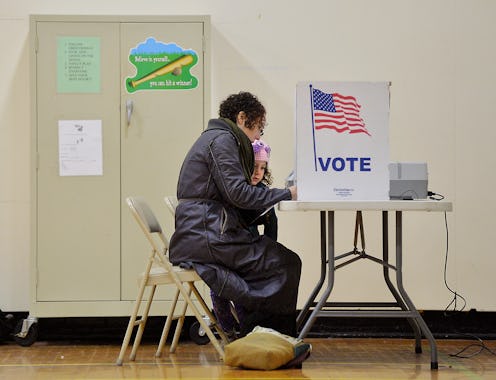News
The GOP's Latest Play For Votes Is Not Subtle
Look out, minorities and low-income voters — the GOP would rather you didn't vote. Voting might soon get more complicated, especially for the least privileged among us, in some key electoral battleground states. Nine states have imposed new rules tightening the voting process since the start of 2013, and the Republican Party has ramped up their familiar efforts to continue this trend, whether legislative or administrative. More rules are currently in consideration.
The majority of these states did this by adopting voter ID laws, a tactic which became common in the lead-up to the 2012 presidential election. Democrats bemoaned the measures, both on constitutional grounds — any fee charged to receive a required voter ID is, after all, the functional equivalent of a poll tax — and by branding the laws cynical efforts to gain an electoral advantage.
Pennsylvania's House Majority Leader Mike Turzai didn't help these matters in June 2012, when he implicitly gave away the game, saying at a Republican State Committee meeting that voter ID "is gonna allow Governor Romney to win the state of Pennsylvania, done." He turned out to be wrong about that, as a judge ruled in favor of suspending the law until after the election, citing concern that enough IDs would not be distributed in time.
The retort by Republicans, beyond claims the new rules will save money and improve efficiency, is familiar: this will stop voter fraud. You don't support voter fraud, do you?
It's worth noting that documented voter fraud is astonishingly rare, and in a country of over 300 million, essentially negligible in effect. Especially as compared to the possible implications of demanding new certifications — some states are currently considering more than even just I.D.s, including birth certificates or passports, to verify proof of citizenship.
The obvious problem with raising the bar on what's needed to cast a vote, itself one of the most deeply-held rights afforded to the citizenry, is that it takes the most out of the people who have the least. Whatever charges might be incurred to avail oneself of the proper documents is just one part of it — efforts have also been made to cut the amount of time people have to vote, a more transparent reflection of the political machinations in play.
In Ohio and Wisconsin, Republicans have passed laws cutting early and weekend voting significantly. This is a common method for communal voting trips, often organized by churches in the state. Similar measures are in effect in North Carolina, which served as one of the foundations of the Moral Mondays movement.
There's no need to worry, however. According to Alex Triantafilou, a Republican county chairman in Ohio, the brouhaha is much ado about nothing.
We think they’re stoking these things for political gain. We think there’s an effort here to rally the Democratic base in a year that they otherwise wouldn’t be rallying.
